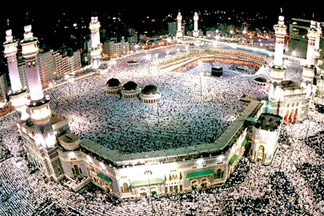Hajj pilgrimage unites Muslims
By Mohammed NAALIR
Muslims in Sri Lanka and Muslims world over will celebrate the Hajj
festival next Saturday. Muslims celebrates this day to commemorate
Prophet Ibrahim's sacrifice to Allah.
|

Holy Kaaba |
The Hajj pilgrimage takes place from the seventh to the 13th day of
Dhul-Hijjah, which is the 12th month of the Islamic calendar.
The Islamic calendar is a lunar calendar and is 11 days shorter than
the Gregorian calendar which is presently used in the Western world. The
Gregorian date of Hajj changes from year to year.
The only dress to worn by pilgrims is the Ihram. Until they complete
the Hajj pilgrimage, they will be wearing only the Ihram. The Ihram is
white. Islam is the way of unity. Islam teaches the unity of mankind and
secondly the unity of the followers of Islam. The Hajj pilgrimage
strongly depicts this concept. It also depicts unity among Muslims.
There is no race, state, rich or poor or colour differences or
discrimination during the Hajj pilgrimage. All pilgrims are treated
equally.
Hajj is the world's largest pilgrimage, a large number of Muslims
from all parts of the world throng to one place.
Hajj is one of the five pillars of Islam, one of the basic principles
and obligations. This is indicated in Al-Qur'an, the Sunnah and
scholarly consensus. It is an individual obligation upon every
accountable person who is able to do it, once in a lifetime.
When a Muslim decides to travel for Hajj or Umrah, he or she has to
fulfill several obligations such as giving up sin, regretting what has
happened in the past, resolving not to return to it, and restoring the
rights of any one whom he has wronged.
One should travel for Hajj and Umrah in the company of good people.
He should have the knowledge of rituals and should not harm or annoy
anyone.
He must avoid any kind of obscenity, sin, disobedience to Allah and
arguments except those that are needed to support the truth. Women must
not travel unless accompanied by a person forbidden to marry.
|

Children get ready for hajj festival |
Every Muslim who has the capacity to maintain his family and manage
the cost of the pilgrimage should do so. The Hajj is the demonstration
of the solidarity of Muslims and their submission to Allah. Millions of
Muslim devotees thronged in Makkah from various parts of the world.
Thousands of Sri Lankan pilgrims are among them.
There are several obligations related to Hajj pilgrimage.
The Miqats of Ihram are of two kinds such as Miqat of time and the
Miqat of place.
There are several compulsory duties to be carried out by a pilgrim
during the Hajj. Kissing the black stone in the corner of Kaaba to wash
away his or her previous sins, running back and forward between the
hills of Al-Safa and Marwah to remind and recall Mother Hajarah,
drinking water from Zam Zam well, going to the plains of Mount Arafa to
stand in vigil and throw stones in the ritual of stones in the ritual of
stoning the devil are some of these.
Then pilgrims shave their heads and perform the ceremonial animal
sacrifice. The flesh of the sacrificed animals is distributed among
poverty-stricken people. It is also an important part of the Hajj
pilgrimage. Finally the pilgrims celebrate the three-day global
festival.
Even though it is not a part of the Hajj pilgrimage every Hajj
devotee tours Madinah and Prophet Muhammad's mosque. Masjid Al Nabavi
which contains Prophet Muhammad's tomb and Raiz ul Jannah.
The pilgrims also visit the grave of the Prophet's companions.
Ummuhat-ul Momineen-Beloved wives of the Prophet and Ahle Bait located
in Jannathul Baqi. On the first morning of Eid al-Adha, Muslims around
the world will attend morning prayers at their local mosques.
Prayers are followed by visits with family and friends, and the
exchange of greetings and gifts. At some point, members of the family
will visit a local farm or otherwise will make arrangements for the
slaughter of an animal. The meat is distributed during the days of the
holiday or shortly thereafter.
It is compulsory for every Muslim to make at least one journey in
their lifetime to Makkah on Hajj if they can afford it.
The teachings of Hajj are very significant to a Muslim's daily life.
During Hajj, we learn to establish our prayers five times a day and stay
clean and pure at all times. Prayer is mandatory during the period of
Hajj as well as throughout one's life. Praying near the Ka'ba rewards a
Muslim more then 100,000 times the reward of praying anywhere else in
the world.
Sacrificing a lamb or goat during Hajj teaches us to share and give
to the poor. It teaches us generosity, kindness, and the ability to
share with others less fortunate. In Mina, when we throw pebbles at the
three pillars representing shaitaan, we learn that we should be truthful
and clean and live a life free of sins.We learn to try to reject and
avoid the evil whispers of shaitaan and stand against him. Apart from
kindness and generosity, Hajj teaches us that Allah has blessed us
greatly.
The water from Zam Zam is a special gift from Allah to Muslims till
the Day of Judgement. It is that anyone who drinks the water of Zam Zam
will be granted a cure from all the illnesses and diseases. Some of the
scholars say that Zam Zam is whatever you make it to be, so for
instance, if you drink Zam Zam water and request Allah to make it a
source of healing from sickness, it will indeed play that role, insha'
Allah. Supplicating at Arafaat is also a blessing.
All duas are answered and all wishes are fulfilled. |


